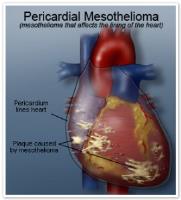 Add My Company
Add My Company
Sign In

Asbestos mesothelioma is one of the most common diseases related to this building material. Mesothelioma is contracted by exposure to asbestos fibres, which are inhaled and can cause untold damage to the human body.
There are six different types of asbestos disease:
Asbestosis
Pleural mesothelioma
Peritoneal mesothelioma
Testicular mesothelioma
Pericardial mesothelioma
Lung cancer
(Image courtesy of Mesothelioma.com)
What is pericardial mesothelioma?
Pericardial mesothelioma is a type of cancer that is caused by asbestos exposure. It is a very rare form of mesothelioma and is hardly ever seen in medicine, affecting just one per cent of the population.
This form of mesothelioma targets the heart – specifically the thin membrane that surrounds it.
Who can be diagnosed with pericardial mesothelioma?
There are more cases of pericardial mesothelioma in men than women, and those between the ages of 50 and 70 are more likely to develop it. This disease can be very easy to misdiagnose, as it is so rare and mimics the symptoms of many other illnesses.
Those that work with or have been exposed to asbestos fibres for many years may contract pericardial mesothelioma. It can be caused by breathing in the fibres, which then enter the bloodstream and end up in the heart. Malignant tumors then develop, which can spread throughout the body.
How is pericardial mesothelioma diagnosed?
Pericardial mesothelioma can be incredibly difficult to diagnose, even for specialists.
The following tests may be carried out:
CT scans
MRI scans
Radionuclide imaging
Biopsies
What are the symptoms of pericardial mesothelioma?
This kind of mesothelioma can take decades to fully develop, so symptoms may not be easy to spot at first.
The main pericardial mesothelioma symptoms include:
Chest pain
Extreme fatigue
Shortness of breath
Pericardial effusion (a buildup of fluid around the heart)
How is pericardial mesothelioma treated?
As pericardial mesothelioma is so rare, little is known about the development of the disease. This means that it has not yet been fully researched and so treating it can be difficult.
In almost all cases, palliative treatments are the only option.
The available palliative treatments for pericardial mesothelioma include:
Pericardial drainage (to filter off the fluid buildup around the heart)
Radiation therapy
Surgery
What is the prognosis for pericardial mesothelioma patients?
The life expectancy for those diagnosed with pericardial mesothelioma is sadly very low. Patients usually only survive between six to 12 months, but much can be done to manage pain and improve quality of life.
The content of this site is intended to inform, not to diagnose. If you believe that you may have symptoms similar to those experienced by pericardial mesothelioma patients, Northern Insulation Contractors advises you to visit your GP immediately.
For more information on Asbestos Diseases: Pericardial Mesothelioma talk to Northern Insulation Contractors
Enquire Now
More related to Asbestos Diseases: Pericardial Mesothelioma
List your company on FindTheNeedle.
